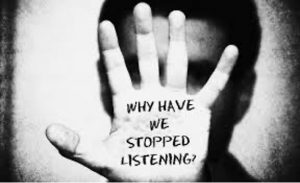Are you listening closely?
How to turn the act of listening into a powerful tool for success.
There’s a quote of Stephen R. Covey’s that I came across, and while it’s one I’ve seen before, it’s one I haven’t stopped to really think about until now:
“Most people don’t listen with the intent to understand. They listen with an intent to reply.”

It struck me because of how true it is in today’s society of fast-paced living, instant gratification, and me-me-me. Our minds wander, our attention is split and our focus is often so fixed on ourselves that when others speak, we’re not so much listening as we are waiting for our turn to speak. Communication is becoming more rushed, more fragmented, less efficient, and the art of listening is becoming a lost one, taking with it one of the most intrinsic ways in which we connect with each other as human beings. The irony is that the more we can slow down, find the time to actively listen to others and genuinely communicate with them, the more opportunities we will find for our own personal and professional growth. That’s because listening is about more than hearing – it’s about understanding, learning, empathising, and ultimately tapping into a greater connection with unlimited potential for success.
Why should we be listening?
In his book, Social Intelligence: The New Science of Human Relationships, Daniel Goleman posits the theory that “we are wired to connect” – that our daily encounters with friends, family, colleagues, clients, and strangers have a “far-reaching biological impact”, and that listening to each other actually makes us smarter, and increases our social intelligence.
Based on personal experience, I’d have to say that it’s a theory I agree with. I remember years ago when cellphones first came to South Africa, I was working as a retail salesman when a customer came in with a specific request. Although I made sure to thoroughly research the products I was selling, I was also focused on listening to my customers, quickly discovering that I could learn more from them than I could from any technical brochure. In this instance, I found that although we didn’t have the particular product or service the client needed, one of our competitors did, and so I pointed him in their direction. Barely an hour later, he returned to our store and stated that he wanted to buy our product instead. When I asked him why, as it wasn’t what he was looking for, he said “I stood for an hour in that store and no one asked me what I wanted or listened to me. I know you can’t give me the product that I want, but I also know that because you listened to me you will give me the service that I need”.
It was then that I learned my first lesson about listening – that all each of us really needs is to feel truly heard. By actively listening to those around us, we are meeting a fundamental human need – and in allowing others to express themselves and use their voices, we are ultimately connecting with them in one of the most authentic ways possible.
What is listening really all about?
It’s this element of connection – this need to relate to one another that drives dialogue and communication. And while being able to accurately articulate our wants and needs is a valuable skill, being able to listen with purpose is just as integral, and potentially powerful as well.
In order to develop our listening abilities, improve our communication and strengthen our relationships, we need to drill down to what the purpose of our listening is – why are we listening, and what are we listening to do? Are we listening merely to be polite and observe the social niceties, or are we listening to learn, to understand, to empathise? No matter what the content of a conversation, there is always value in it for both people involved – for the speaker, the value of sharing and being heard; for the listener, the value of learning, understanding, and connecting. Whether we are listening in a personal or a professional capacity, each conversation is an opportunity for us to relate to another human being, and to grow as a result. And the more we are able to see listening for what it really is – a chance to improve, develop and grow – the more successful we will be both in listening, and in life.
How should we be listening?
So if listening is about improving communication and improving ourselves, how do we go about improving our listening skills to start with? The answer – by understanding how we listen in the first place. Do we passively listen, sitting there while words wash over us? Or do we actively listen, hearing with our ears, watching with our eyes, and connecting with our minds?
Neuroscientific research has shown that our thoughts are interrupted approximately every 20 seconds – either through external factors like social media notifications, phone calls, texts, or visits, or through internal factors like mind-wandering and a lack of concentration. What’s more, with a full 93% of our communication deriving from non-verbal cues such as behaviour and gestures, it’s easy to see how we can miss out on crucial elements of the listening process almost without noticing.
In order to move from passive to active listening, and reap the benefits of authentic connection and powerful communication, we need to develop our awareness – to shut off technological distractions, to be fully present in the moment, and to be aware both of what people say, and how they are saying it. In this way, we will not only be able to improve the way we listen and connect, but we will also be able to add more value to conversations, and extract more value from them as well. Just think how limitless our potential for strengthening relationships would be!
Using listening as a vehicle for change
In Stephen R. M. Covey’s book, The Speed of Trust, he describes trust as “the one thing that changes everything”, and asserts that the most powerful way to build trust is through listening, and feedback – the cornerstones of effective communication. Similarly, Nancy Kline in her book, Time to Think: Listening to Ignite the Human Mind, talks to listening as the essential tool of good management, and how by creating a technique she refers to as “creating a thinking environment”, we are able to improve not only the way we think but the way we work and live as well.
It’s this “thinking environment” that we’re most interested in exploring at Latitude Training – understanding more about the power of listening, and how we can use it to actively shape and develop our personal and professional relationships going forward. It’s also why, if you’re as interested in the power of listening as we are, you have an open invitation to join any of our training sessions or workshops, and explore this strategy for success with us. Because the more we can learn to actively listen to, and empathise with one another, the more joy and value we can add to each others lives as a result.
References:
1. Goleman, D. “Social Intelligence: The New Science of Human Relationships“. Accessed on 22 September 2015.
2. Kline, N. “Time to Think: Listening to Ignite the Human Mind“. Accessed on 22 September 2015.
3. Covey, Stephen M. R. ” The SPEED of Trust: The One Thing That Changes Everything“. Accessed on 22 September 2015.
4. Covey, Stephen M. R. ” Smart Trust: The Defining Skill that Transforms Managers into Leaders“. Accessed on 22 September 2015.

